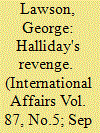| Srl | Item |
| 1 |
ID:
107558


|
|
|
|
|
| Publication |
2011.
|
| Summary/Abstract |
Fred Halliday saw revolution and war as the dual motors of modern international order. However, while war occupies a prominent place in International Relations (IR), revolutions inhabit a more residual location. For Halliday, this is out of keeping with their impact-in particular, revolutions offer a systemic challenge to existing patterns of international order in their capacity to generate alternative orders founded on novel forms of political rule, economic organization and symbolic authority. In this way, dynamics of revolution and counter-revolution are closely associated with processes of international conflict, intervention and war. It may be that one of the reasons for Halliday's failure to make apparent the importance of revolutions to IR audiences was that, for all his empirical illustrations of how revolutions affected the international realm, he did not formulate a coherent theoretical schema which spoke systematically to the discipline. This article assesses Halliday's contribution to the study of revolutions, and sets out an approach which both recognizes and extends his work. By formulating ideal-typical 'anatomies of revolution', it is possible to generate insights that clarify the ways in which revolutions shape international order.
|
|
|
|
|
|
|
|
|
|
|
|
|
|
|
|
| 2 |
ID:
152181


|
|
|
|
|
| Summary/Abstract |
The international order is built on the principles of sovereign equality, national interests, great powers and respect for human rights among others. International rivalry and cooperation have existed side by side over the past few centuries, while the foundations of an international order have solidified. We are now seeing a transition in the international order that requires new innovative ways of thinking. China is seen as the key driver of these changes because of its unique status, pattern of growth and future potential. China should embrace this historic opportunity and take on its obligations to contribute to the birth of a new modern international order.
|
|
|
|
|
|
|
|
|
|
|
|
|
|
|
|